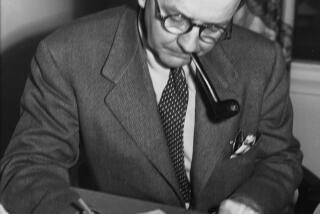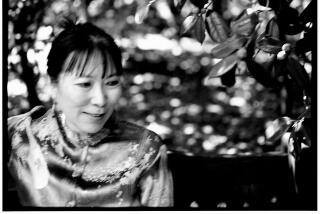Quoting the lines, searching out the true poets: an unending game for us don’t-even-know-its
- Share via
The trouble with Ogden Nash is that every brief, clever verse whose author one can’t remember is attributed to him.
Oddly, however, one of Nash’s neater verses is often attributed to Dorothy Parker:
Candy
Is dandy
But liquor
Is quicker
Dorothy Parker did write:
Men seldom make passes
At girls who wear glasses.
Now that we have those two correctly attributed, maybe we can finally determine the author of that enduring verse that I remembered in this evidently bastard form:
Little bugs have littler bugs
Upon their backs to bite ‘em
And littler bugs have littler bugs,
And on ad infinitum.
Grant Shepard attributed this to Nash, in different form:
Big fleas have little fleas
Upon their backs to bite ‘em;
And little fleas have lesser fleas
And so, ad infinitum.
Shepard also said that Nash was the author of what is sometimes thought to be the shortest poem in English.
Adam
Had’m.
M. Lewis Thompson observed that Jonathan Swift treated the subject as follows in 1733:
So, naturalists observe, a flea
Hath smaller fleas that on him prey;
And these have smaller still to bite ‘em,
And so proceed ad infinitum.
Thus, every poet, in his kind,
Is bit by him that comes behind.
Thus, Swift anticipated the plagiarizing of his own verse.
But I doubt that Nash did it. No one has found it in his canon. More than one reader, however, has written to identify the culprit as one Augustus De Morgan (1806-1871).
Alfred Slater of Camarillo notes that the poem appears in De Morgan’s “A Budget of Paradoxes,” in this form:
Great fleas have little fleas
Upon their backs to bite ‘em,
And little fleas have lesser fleas,
And so ad infinitum
Except for the substitution of great for big , that is the same form attributed by Shepard to Nash; the variation would give Nash little defense against a charge of plagiarism. I doubt that he was guilty.
Josephine F. Crum of San Diego also attributes the verse to De Morgan, noting that he added four lines:
And the great fleas themselves, in turn,
Have greater fleas to go on;
While these again have greater still,
And greater still, and so on.
Shepard was also incorrect, evidently, in attributing Adam/Had’m to Nash.
“It was not Nash,” writes Caryl Porter of Monrovia, “but Strickland Gillilan (1869-1954) who wrote what he thought was the shortest poem in English:
Adam
Had’m.
“When he was challenged by a contemporary versifier, Gillilan wrote an even shorter one:
I . . .
Why?
Paul S. Deems quotes from E. L. Doctorow’s “World’s Fair”: “My father was now inspired to recite the shortest poem in the English language. . . . ‘Adam had’m,’ (he) said. . . . “
Deems thinks Nash might have been the author, since he would have been aware of Paul de Kruif’s popular “Microbe Hunters.”
John A. Cloes of Huntington Beach writes that he looked in vain through his Nash collection for the fleas verses, but he verifies Deems’ guess that Nash was interested in bugs, and quotes a verse to prove it:
The insect serves some useful end,
But what it is I’ve never kenned.
I do not like the ones that buzz,
I do not know a soul who does;
And as for those that crawl and creep,
The more they die, the less I weep.
Yet such is ego, low and high,
They’d rather be themselves than I.
That reminds me of Archy the cockroach’s search for the soul of a poet to occupy; after a couple of days in the cold he comes back to his own body, only to find it squashed.
By the way, I have been chastised for spelling Archy with a capital A , since we all know that Archy had to fall on the keys to type, and couldn’t work the shift key to make capitals.
I quote from E. B. White’s introduction to “the lives and times of archy & mehitabel.”
“The reader will have perhaps noticed that I am capitalizing the name Archy and the name Mehitabel. I mention this because the capitalization of Archy is considered the unforgivable sin by a whole raft of old Sun Dial fans who have somehow nursed the illogical idea that because Don Marquis’s cockroach was incapable of operating the shift key of a typewriter, nobody else could operate it. This is preposterous. Archy himself wished to be capitalized--he was no e. e. cummings. In fact he once flirted with the idea of writing the story of his life all in capital letters, if he could get somebody to lock the shift key for him. Furthermore, I capitalize Archy on the highest authority: Whenever in his columns Don Marquis referred to his hero, Archy was capitalized by the boss himself. What higher authority can you ask?”
And what better writer of prose can I quote?
More to Read
Sign up for our Book Club newsletter
Get the latest news, events and more from the Los Angeles Times Book Club, and help us get L.A. reading and talking.
You may occasionally receive promotional content from the Los Angeles Times.







